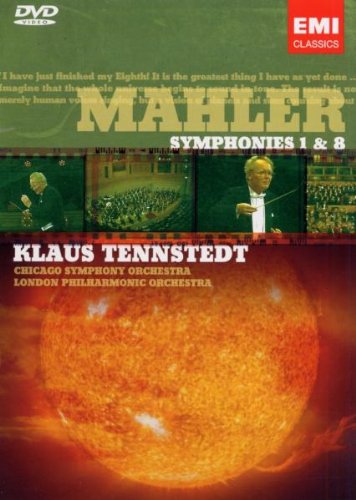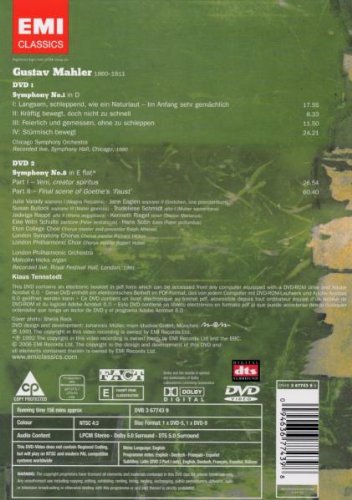05:58
Mahler: Symphonies 1 & 8 (Symphony of a Thousand) / Klaus Tennstedt, Chicago Symphony Orchestra, London Philharmonic Orchestra [DVD9]
Posted by Bravo Bravissimo
Mahler: Symphonies 1 & 8 (Symphony of a Thousand) / Klaus Tennstedt, Chicago Symphony Orchestra, London Philharmonic Orchestra [DVD9]
Conductor: Klaus Tennstedt | Composer: Gustav Mahler | Eton College Choir chorus master and presentor: Ralph Allwood | London Symphony Chorus chorus master Richard Hickox | London Philharmonic Choir chorus master Rupert Huber | Director: Rodney Greenberg | Performers: Kenneth Riegel, Susan Bullock, Jane Eaglen, Julia Varády | Orchestra/Ensemble: Chicago Symphony Orchestra, London Philharmonic Orchestra | Label: Warner Classics | DVD | NTSC 4:3 (720x480) VBR | (LinearPCM, 2 ch), (Dolby AC3, 5 ch), (DTS, 5 ch) | File hosts: Uploaded.net, share-online.biz | 5% recovery + 3 .rev files | Run time: 156 minutes | 6.15 GB Language: English | Recorded Live at the Royal Festival Hall, London, 27 & 28 January 1991
Conductor: Klaus Tennstedt | Composer: Gustav Mahler | Eton College Choir chorus master and presentor: Ralph Allwood | London Symphony Chorus chorus master Richard Hickox | London Philharmonic Choir chorus master Rupert Huber | Director: Rodney Greenberg | Performers: Kenneth Riegel, Susan Bullock, Jane Eaglen, Julia Varády | Orchestra/Ensemble: Chicago Symphony Orchestra, London Philharmonic Orchestra | Label: Warner Classics | DVD | NTSC 4:3 (720x480) VBR | (LinearPCM, 2 ch), (Dolby AC3, 5 ch), (DTS, 5 ch) | File hosts: Uploaded.net, share-online.biz | 5% recovery + 3 .rev files | Run time: 156 minutes | 6.15 GB Language: English | Recorded Live at the Royal Festival Hall, London, 27 & 28 January 1991

"These recordings are with two different orchestras (Mahler 1st with the Chicago Symphony and the 8th with the London Philharmonic). Tennstedt's live performances are much better than his studio versions of the same works, and it's wonderful to watch him coaxing what he wants from the players. Even though he conducts from the score rather than from memory, he always seems to be directly connected to the orchestra in an almost magical way. The sound is good in both performances, and there is a sense, on both occasions, of being present for something quite special. These are great performances. High recommended!"
Watch a Trailer (sample is a lower resolution than actual DVD or Blu-ray):
REVIEW FANFARE: Christopher Abbot
Klaus Tennstedt recorded the Mahler Eighth in 1986 for EMI as the capstone to his cycle of the symphonies, and that performance has been justly celebrated as one of the more successful studio accounts of this colossal piece (it has recently been reissued in EMI’s “Great Recordings of the Century” series, paired with the Fourth Symphony). Only two of the soloists from that recording—Trudeliese Schmidt and Hans Sotin—repeat their roles in this concert recording, but for the most part, there is no loss of star power, and at least one definite improvement: the splendid Doctor Marianus of Kenneth Riegel. In fact, the soloists are quite well matched and form a formidable septet for the first movement.
The voices are very prominent in the sound mix, with the orchestra all but inaudible during some of the passages for the entire ensemble. The sound is much less congested on the 1987 CD, where the forces are more naturally balanced (voices behind the orchestra) and the sense of acoustic space is truer. It is possible that the number of voices for the 1991 concert was considerably larger: two choruses (besides the boys’) are credited, where only the LPO Choir, however augmented, participated in the studio recording.
The two performances—CD and DVD—have in common an unerring sense of momentum in the first part and of architectonic drama in the second. Watching the performers, one is convinced that Tennstedt elicited their full attention, producing committed and energized performances whose cumulative power is manifest: the passage sung by the Chorus Mysticus begins in near silence, then gains in intensity as the soloists join in; the final measures are truly awesome. The ovation that follows is entirely justified, and the producers have retained the “curtain calls.”
The video production is unfussy and effective, with views of instrumentalists and choruses alternating with views of the entire ensemble and those of the conductor. There is even a shot of Susan Bullock far above the stage, radiant as Mater gloriosa.
The recording of the First Symphony that initiated the EMI Mahler symphony cycle was made with the London Philharmonic in 1977; this newer performance in Chicago was released on CD as a sort of “one-off” in 1990. The richness of the sound of this orchestra, and the impressive digital recording (replicated on this DVD), were attractive to listeners who were dissatisfied with the earlier version, particularly with the less than stellar sonic image (though that has been much improved in the recent re-mastering, paired with the “Resurrection” Symphony on an EMI double CD reissue).
For me, this was one of the less impressive Tennstedt performances, partly due to the expansive, overly languid tempos—there is geniality aplenty, but not enough vigor in this performance. The second movement fares far better than the first, with nicely judged tempos and real energy. The quick-march theme in the third movement suffers from the same sort of over-deliberateness as the first movement, but the Gesellen song theme is lovely, and the klezmer-style music is quite jaunty. The finale erupts just as the last note of the preceding march is fading, and Tennstedt’s look of determination is met with playing of impressive weight and power; once again, though, the orchestra is held back just when one wants it to break loose and really scream.
The video production for this concert is plagued by ghosts in the video image, making for a very indistinct picture; there is also a sort of glare that produces a very “hot” image, and the color is washed out, with the skin tones on the distinctly pasty side.
For those unfortunates among us who never saw Klaus Tennstedt in concert, this video release is essential: however undisciplined his baton technique and ungainly his podium movements, there is no doubting the efficacy of his leadership, producing music of power and emotional impact, particularly in Mahler, whose symphonies he continued to conduct and refine in concerts and in several alternate recorded versions.
One aspect of this release cannot go unremarked: annotator John Willan, who served as Tennstedt’s producer (not for these two recordings, though) and subsequently as managing director of the LPO, confesses that he was somewhat skeptical of Tennstedt’s talents because, “After all, Mahler can’t be that hard with a good orchestra: not like Haydn or Mozart. All you need is to start it off and then it’s just one enormous romantic wallow.” This is such errant nonsense that I could almost be convinced that Willan writes with tongue in cheek, except that he ends the story with the observation that it was only when Tennstedt tackled Prokofiev’s Lt. Kije Suite that he “never doubted him again.” This from the producer of most of the Tennstedt Mahler symphony cycle! No wonder the sound production for the EMI set is one of its least attractive aspects.
Works on This Recording 1. Symphony no 1 in D major "Titan" by Gustav Mahler Conductor: Klaus Tennstedt Orchestra/Ensemble: Chicago Symphony Orchestra Period: Romantic Written: 1888/1896
2. Symphony no 8 in E flat major "Symphony of A Thousand" by Gustav Mahler Performer: Kenneth Riegel (Tenor), Susan Bullock (Soprano), Jane Eaglen (Soprano), Julia Varády (Soprano), Trudeliese Schmidt (Mezzo Soprano), Jadwiga Rappé (Alto), Eike Wilm Schulte (Baritone), Hans Sotin (Bass) Conductor: Klaus Tennstedt Orchestra/Ensemble: London Philharmonic Orchestra Period: Romantic Written: 1906; Vienna, Austria
 No Password
No Password


0 comments:
Post a Comment